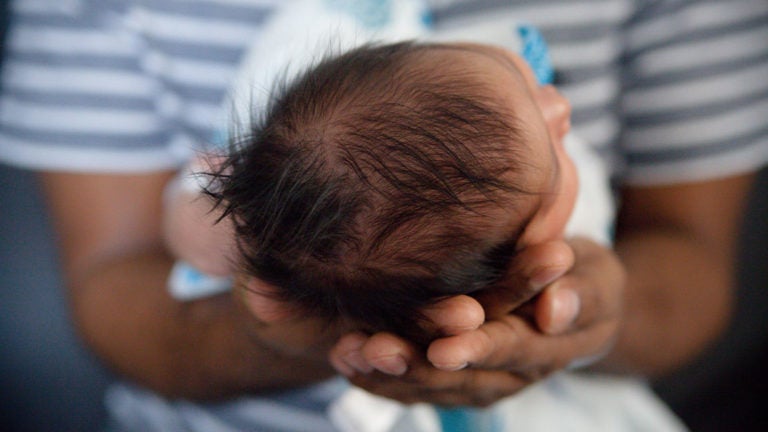N.J. lawmakers seek to mandate bias training for maternal-infant health care workers
Assemblywoman Shanique Speight says that a second proposal will require similar training for medical providers in other practice areas

Studies show that bias on the part of health care providers — both conscious and not — directly impacts the quality of care some patients receive and their treatment results. (Twenty20)
This article originally appeared on NJ Spotlight.
–
Health care workers at New Jersey birthing facilities would get regular bias training to help them identify and overcome racial and cultural prejudices, under a bill designed to help shrink the significant racial disparities in the state’s system of maternal and infant care.
The state Assembly health committee voted to advance the measure Thursday following the first hearing on the legislation, which was initially introduced in November; the Senate has yet to consider the measure. The proposal was supported by a range of hospital and physician groups, but opposed by several conservative groups, including one concerned it was designed to promote abortion — something the lead sponsor quickly refuted.
Black mothers in New Jersey die at nearly four times the rate of white mothers when giving birth. State officials, led by First Lady Tammy Murphy, have made it a priority to close this gap and cut in half the maternal mortality rate by 2025. Studies show that bias on the part of health care providers — both conscious and not — directly impacts the quality of care some patients receive and their treatment results.
“The evidence, I would say, is ripe that there are issues related to cultural biases that have impacts on health care and for many people, negative impacts on health care,” said Assemblyman Herb Conaway Jr., a doctor who chairs the health committee; Conaway, who is black, recalled how during his own medical training a professor tried to limit treatment options for a young African American man from Camden with serious lung problems, suggesting the patient didn’t care enough about his health.
While it’s common, Conaway said most providers aren’t aware of their own bias. “So that’s one of the important things about training,” he added.
‘This is just a step’
Assemblywoman and lead sponsor Shanique Speight (D-Essex) said her colleagues would soon introduce a second proposal that will require similar, evidence-based bias training for medical providers in other practice areas; racial disparities in outcomes are not limited to maternity care. “It is worth doing something broader,” she told NJ Spotlight. “This is just a step.”
Speight’s maternal-infant care proposal builds on New Jersey’s ongoing efforts to improve maternal care outcomes, including standardizing training for birthing centers, investing in community-based maternal caregivers including doulas, who provide nonclinical support to pregnant women, and expanding access to prenatal care. The state recently ranked 47th nationwide for its poor maternal health outcomes, according to one frequently cited study.
While several states have instituted programs to help various health care providers identify and curb racial prejudices, Assembly staff said Speight’s proposal reflects a law California adopted in October that calls for bias training specifically at birthing facilities. New Jersey has also modeled other reforms on California’s work, which helped reduce maternal morality there by 55% over seven years.
“Government officials and healthcare professionals alike have been making a concerted effort to improve maternal health outcomes in our state,” Speight said. “But this endeavor ultimately cannot succeed unless every mother receives the same standards of treatment. That means we have to address the underlying biases that are serving as a barrier to quality healthcare for far too many women of color in New Jersey.”
Speight’s bill (A-1079) — also sponsored by Assemblywomen Eliana Pintor Marin (D-Essex) and Verlina Reynolds (D-Mercer) — calls for the state’s 49 hospital birthing centers to give evidence-based bias training to all health professionals who provide perinatal care, which generally begins four to six weeks before birth and extends to as much as a month after delivery. After the initial training, clinicians would need to take a refresher course at least every two years.
Ignoring symptoms, dismissing complaints
“As we examine maternal and infant mortality disparities in New Jersey, my colleagues and I have heard some genuinely heart-rending stories that shine a spotlight directly on the role implicit bias plays in impacting the quality of care,” Pintor Marin said. “We are seeing clear patterns that reveal providers spending less time with patients of color, ignoring their symptoms, dismissing their complaints, and undertreating their pain, putting them at much greater risk of complications.”
“The key to solving this problem lies in understanding that implicit bias means that the provider doesn’t even realize they are treating certain patients differently based on unconscious thought processes,” she added. “Training to recognize and overcome that is not just necessary, but critical.”
Under the bill, the training must help clinicians identify and understand their own prejudices, learn about the barriers to inclusive care and better understand cultural identities across various racial and ethnic groups. Participants would also study the historical impact bias has in medical care — particularly maternal care — and learn ways to improve communication and overcome these tendencies, both as individuals and within the hospital systems.
But Marie Tasy, executive director of New Jersey Right to Life, questioned what she said was the ambiguous language in the bill and its reference to “reproductive justice,” which she said is code for abortion. “Reducing infant and maternal mortality are laudable goals,” she said. “But does this mean that health care workers will have to promote abortion at these facilities which have traditionally been designed to help women give birth to their babies?”
No link to abortion intended
According to Sister Song, a leader in the movement for reproductive justice, it relates to the “human right to maintain personal bodily autonomy, have children, not have children, and parent the children we have in a safe and sustainable community.”
Speight agreed the term is not linked to abortion and that is not the intent of the bill. “In no way, shape or form does it have anything to do with abortion,” she said.
For Reynolds-Jackson, improving equality can “mean the difference between life and death” for black women, given the existing disparities. “Every patient deserves to be treated with dignity and respect, regardless of their race, ethnicity or background,” she said.
WHYY is your source for fact-based, in-depth journalism and information. As a nonprofit organization, we rely on financial support from readers like you. Please give today.




